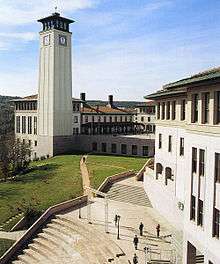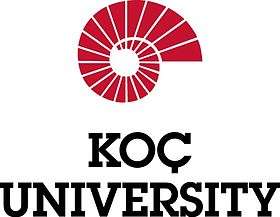Koç University
| Koç Üniversitesi | |
|
Seal of Koç University | |
| Type | Private - Non-Profit[1] |
|---|---|
| Established | 1993[2] |
| Chairman | Rahmi Koç[3] |
| President | Prof. Umran Inan[4] |
| Vice-president |
Prof. M. İrşadi Aksun (Research and Development)[5] |
| Founder | Vehbi Koç[7] |
Administrative staff | 312 |
| Undergraduates | 2935 |
| Postgraduates | 600 |
| Location |
Sarıyer, Istanbul, 41°20′53″N 29°07′32″E / 41.34806°N 29.12556°ECoordinates: 41°20′53″N 29°07′32″E / 41.34806°N 29.12556°E |
| Campus |
Rumelifeneri Campus in Sarıyer[8] |
| University Press | Koç University Press[10] |
| Affiliations |
Vehbi Koç Foundation[2] |
| Website |
www |
Koç University is a private university in Istanbul, Turkey.[1] It started education in temporary buildings in İstinye in 1993, and moved to its current Rumeli Feneri campus near Sarıyer in 2000.[9] University currently consists of Colleges of Social Sciences and Humanities, Administrative Sciences and Economics, Science, Engineering, Law, Nursing and Medicine.[2] Koç University offers 22 undergraduate, 31 graduate and 16 PhD programs.[2]

History
It was founded in 1993 by the Vehbi Koç Foundation, with the aim of creating a world-class university and stimulating modern research.[12] The majority of classes (over 96%[13]) at Koç University are taught in English (few exceptions are found only in the School of Law and School of Nursing)[14] The university has about 5,500 students and charges the highest tuition amongst all universities in Turkey. It accepts international students from various countries and has an extensive network of partner-universities.[13]
Faculties, departments and schools
Koc University has the following academic units:[14]
- College of Administrative Sciences and Economics (CASE)
- College of Sciences (CS)
- College of Social Sciences and Humanities (CSSH)
- College of Engineering (CE)
- Law School
- School of Medicine (SOM)
- School of Nursing (SON)
- Graduate School of Business (GSB)
- Graduate School of Sciences & Engineering (GSSE)
- Graduate School of Social Sciences & Humanities (GSSSH)
- Health Sciences Institute (GSHS)
Rankings
The Times Higher Education World University Rankings ranked Koç University as follows:
| Year | Turkey | In Asia | In the World |
|---|---|---|---|
| 2013 | 3rd[15] | 31st[15] | 226-250th[16] |
| 2014 | 5th[17] | 40th[17] | 276-300th[18] |
The same organization listed Koç among the category 100 under 50 Years as follows:
| Year | Turkey | In the world |
|---|---|---|
| 2013 | 1st[19] | 31st[19] |
| 2014 | 2nd[20] | 41st[20] |
THE powered by Thomson Reuters ranked Koç in the category BRICS & Emerging Economies as follows:
| Year | Turkey | In the world |
|---|---|---|
| 2014 | 5th[21] | 20th[21] |
Koç University was ranked as the 73rd best business school in Europe overall and 29th for the EMBA program in 2011 by the Financial Times.[22]

People
Presidents
- Seha Tiniç (1993-2001) He resigned from the presidency due to a conflict with the founding Koç family about the faculty salaries.
- Attila Aşkar (2001-2009)
- Umran Inan (2009–present)
Notable professors
- Sumru Altuğ
- Elif Batuman
- Alphan Sennaroğlu
- A. Murat Tekalp
- M. Irsadi Aksun
- Tekin Dereli
- Yaman Arkun
- Burak Erman
- Can Erkey
- Metin Türkay
- İsmail Lazoğlu
- Çiğdem Kağıtçıbaşı
- Halil İbrahim Kavaklı
- K. Aslihan Yener
- İskender Yılgör
- Özlem Keskin
- Fikri Karaesmen
- Mehmet Somer
Campus
-
The Portal of Knowledge
-

Sunrise at Koç University
-

The Clock Tower
-

Main plaza and Student Union
-

Main campus interior
-

Rahmi M. Koc Engineering Faculty
Notes and references
- 1 2 "About KU". Koç University. Archived from the original on 2014-08-11. Retrieved 2014-08-11.
- 1 2 3 4 "About KU/History". Koç University. Archived from the original on 2014-08-11. Retrieved 2014-08-11.
- ↑ "About KU/Chairman". Koç University. Archived from the original on 2014-08-11. Retrieved 2014-08-11.
- ↑ "About KU/President". Koç University. Archived from the original on 2014-08-11. Retrieved 2014-08-11.
- ↑ "A massage from Vice President for Research and Development". Koç University. Archived from the original on 2014-08-11. Retrieved 2014-08-11.
- ↑ "VPAA Staff Directory and Contact Information". Koç University. Archived from the original on 2014-08-11. Retrieved 2014-08-11.
- ↑ "About KU/Founder". Koç University. Archived from the original on 2014-08-11. Retrieved 2014-08-11.
- 1 2 3 4 5 "Campus Life". Koç University. Archived from the original on 2014-08-11. Retrieved 2014-08-11.
- 1 2 "ISTINYE CAMPUS". Koç University. Archived from the original on 2014-08-11. Retrieved 2014-08-11.
- ↑ "About Koç University Press". Koç University Press. Archived from the original on 2014-08-11. Retrieved 2014-08-11.
- ↑ "Bologna Process". Koç University. Archived from the original on 2014-08-12. Retrieved 2014-08-12.
- ↑ "About KU/Mission". Koç University. Archived from the original on 2014-08-11. Retrieved 2014-08-11.
- 1 2 "About/International Prestige". Koç University. Archived from the original on 2014-08-11. Retrieved 2014-08-11.
- 1 2 "Academic Programs". Koç University. Archived from the original on 2014-08-11. Retrieved 2014-08-11.
- 1 2 "The Asia University Rankings". Times Higher Education. Archived from the original on 2014-08-12. Retrieved 2014-08-12.
- ↑ "The World University Rankings". Times Higher Education. Archived from the original on 2014-08-12. Retrieved 2014-08-12.
- 1 2 "The Asia University Rankings". Times Higher Education. Archived from the original on 2014-08-12. Retrieved 2014-08-12.
- ↑ "The World University Rankings". Times Higher Education. Archived from the original on 2014-08-12. Retrieved 2014-05-24.
- 1 2 "The One Hundred Under Fifty". Times Higher Education. Archived from the original on 2014-08-12. Retrieved 2014-08-12.
- 1 2 "The One Hundred Under Fifty". Times Higher Education. Archived from the original on 2014-08-12. Retrieved 2014-08-12.
- 1 2 "The BRICS & Emerging Economies Ranking". Times Higher Education. Archived from the original on 2014-08-12. Retrieved 2014-08-12.
- ↑ "European Business School Rankings 2011". The Financial Times. Archived from the original on 2014-08-12. Retrieved 2014-08-12.
External links
| Wikimedia Commons has media related to Koç University. |
- Koc University homepage
- Koc University virtual tour
- Koc University library
- Koc University Football Team, Koç Rams
- Koc University Incubation Center
| ||||||||||||||
| ||||||||||||||||||||||||||||||
